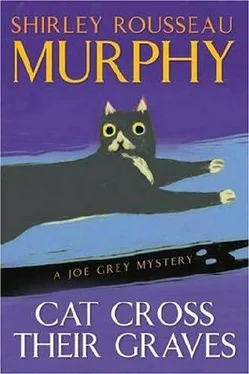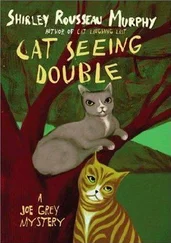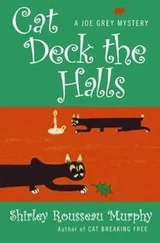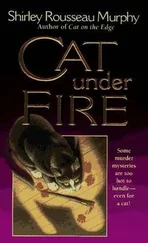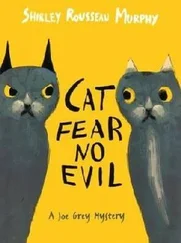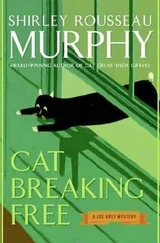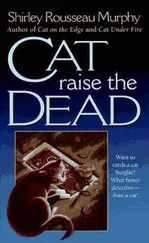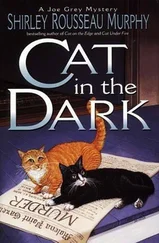Finding only bushes, she scrambled through into the next yard, bloodying her legs and arms and tearing her shirt. Dodging into the shadows beside a little shed, she paused to stare in through its open door.
Clay pots, bags of fertilizer, garden tools, a bucket. She could hide in there, pull the door closed and maybe lock it.
Yes, and be trapped there.
Slipping out again, she pushed the door shut. Maybe he'd think she was in there, waste a few minutes looking.
Zigzagging through a tangle of trees and bushes, she raced for the next street and the next; and she heard him behind her, running. Making for the next block, she doubled back toward the shops where there were people. A snapping sound behind her, like a branch breaking. Dodging between houses, she crawled under a porch, squeezed back under the steps and out of sight. The street before her was busy with traffic, and lined with parked cars. He was coming, his feet squinching the wet leaves.
Slipping out from under the porch again, she fled between the parked cars and into the middle of the street. Running down the street between the two lanes of slow-moving cars, he didn't dare grab her. Horns honked. A woman yelled at her to get out of the street. She couldn't hear, in the traffic, if he was behind her. She was across Ocean again. What did he want? Dodging between the northbound line of cars, she ducked into the brick-paved alley behind the deli. Swerving around the little benches and potted trees, she startled a group of cats and they scattered everywhere, some into the street, some up a vine. He was still coming, running, his footsteps squeak, squeak, squeaking on the pavement. She considered the wooden trellis. Would it hold her? Racing past the closed back door where the cats had been gathered, she leaped at the frail trellis slats and climbed fast.
But he swerved into the alley, lunging for the trellis. Grabbed her foot, jerked so hard she fell. At the same instant the door was flung open and a fat man appeared. Round, shiny face, round, smooth head, and dressed all in white. He stood, startled, staring. The small man froze in place holding her, his face all sharp lines and dark stubble. "Keen." That was Mama's word. Keen with hate. Why? Through the open door, the shop smelled of spice and sugar, cinnamon, hot cheese browning in ovens. The small man stared past her at the round man. When the round man grabbed for Fenner, as if he'd squish him, Fenner twitched and backed away, dragging her; then he dropped her and ran, pelting through the alley and into the street. Her heart was pounding so hard she wanted to throw up. She stood with her head down until the feeling passed.
When she looked up, the man in white took her hand. "Come into the deli. I'll call the police."
"No! Oh, no!"
"The deli's safe enough."
"Please. Don't call anyone."
"I… All right." He looked surprised, but he didn't fuss like most grown-ups. He led her inside, into a big bright room filled with little tables and wire chairs, long windows all facing the street. A tall counter along the back with a glass front was crowded with cakes and pies and roast beef and sliced ham and salads.
He led her to a table in the corner, away from the windows. Sitting down, she stared out at the sidewalk but didn't see the small man. Only cars moving, and tourists, some with dogs on leashes, and locals going to work in jeans and sweatshirts. The round man disappeared into the back. There were people at three of the tables. Two women in jeans drinking coffee and eating something that smelled of bacon and onions and cheese, three men in sport coats and jeans, and a young pale woman drinking tea and reading a paperback book. They all glanced up at her and then turned politely away. The round man returned with a glass of milk and a slice of cake. She wasn't hungry but when she started to eat she devoured everything-the cake was carrot like Mama made, and the milk was cold and good. Maybe she was making up for lost meals. When she had finished, the fat man sat down across from her.
"I'm George Jolly, this is my shop," he said with pride. "You know that man?"
"No! I… He just… He just chased me."
"I thought maybe you didn't want to get him in trouble."
She shook her head. "I just… I don't want the police."
"Okay. But shall I call someone else? Your mother? To come and take you home, safe?"
My mother's dead. Mama can't take me home. "I'll be all right now." She knew she was being foolish. Mama would scold her for being so foolish. He could call Cora Lee. When she first got in the car, Cora Lee had slipped a piece of paper into Lori's pocket, with her house phone and cell phone numbers. Now, when Lori hesitated, he said, "Who should I call?'
She shook her head. "No one. He won't dare follow me again, not in the middle of the village, with so many tourists and cars."
He started to speak.
"I'll be fine. Some weirdo, that's all. When… when I've gone, you could call the police then, if you want. Tell them what he looked like."
"I can do that," George Jolly said, brightening.
"Just don't tell them what I look like."
Mr. Jolly grinned at her. "He looked like a little, hard beetle, all angles and as if he had a hard shell."
Lori grinned back at him. "That's exactly what he looked like! Hard, beady eyes, too, like a beetle." Like a beetle you'd find in the garden that the kids in Greenville liked to squish under their boots to hear it pop. She rose and took George Jolly's hand. "Thank you," she said softly. She left Jolly's Deli telling him she'd be fine, but the minute she was on the street she was scared again. That cold, falling feeling again, in the pit of her stomach.
She could go to Genelle's, but the library was closer. Hurrying along the street among window-shopping grownups, she wanted, now, only to get back into her cave.
And she knew something more about the beetle man. She knew, now, she'd seen this man when she was little. It was the same man, she was sure. He came in the schoolyard when she was six. In the second grade. In the schoolyard, standing inside the fence by the drinking fountain. They were playing kickball. Every time she ran near him, he watched her. He was there again the next day. She was eating lunch alone on a bench, reading. He sat down next to her and asked her what grade she was in and could he see her arithmetic and spelling papers that she had in her backpack. She stared at him and ran, back into the building. She'd called Mama, and Mama came for her. Mama didn't know who he was. That day had scared them both.
Uncle Hal always wanted to see her schoolwork, too. Or wanted her to play numbers games and do puzzles. At first she'd liked that. But Pa would make him stop, Pa didn't like those games. And that made Mama mad. Mama said, "What's wrong with her being smart? Why are you so set against a girl being smart? What if she were a boy?" Pa said it wouldn't make no difference, and then they'd fight and she, Lori, would go in her room and turn on her little radio loud and read a fairy tale that ended up happy.
Now, hurrying along the sidewalk staying in a crowd of people, she looked across at a shop window where a shadow moved, then jerked away suddenly behind the china and glassware. Fenner? She stopped for only an instant to look, but now there was nothing. Two women inside; she saw no one else. Hurrying across the library garden and in through the library's front door, she glanced back at the street. When she didn't see him, she slipped into the children's room.
The librarian was starting story hour. He didn't dare come here, among the children. She sat down on a floor cushion beside the crowded window seat, leaned against its cushioned edge beside the dangling feet of a four-year-old who was in turn snuggled up to an older child. She looked at the kind face of the librarian and listened to her quiet voice, and slowly she let the story take her away, saw the goats and the mountain and the grandfather and let the story become real, let the ugliness fade away until it was gone. Almost gone. He couldn't get her here, not in this safe place.
Читать дальше
